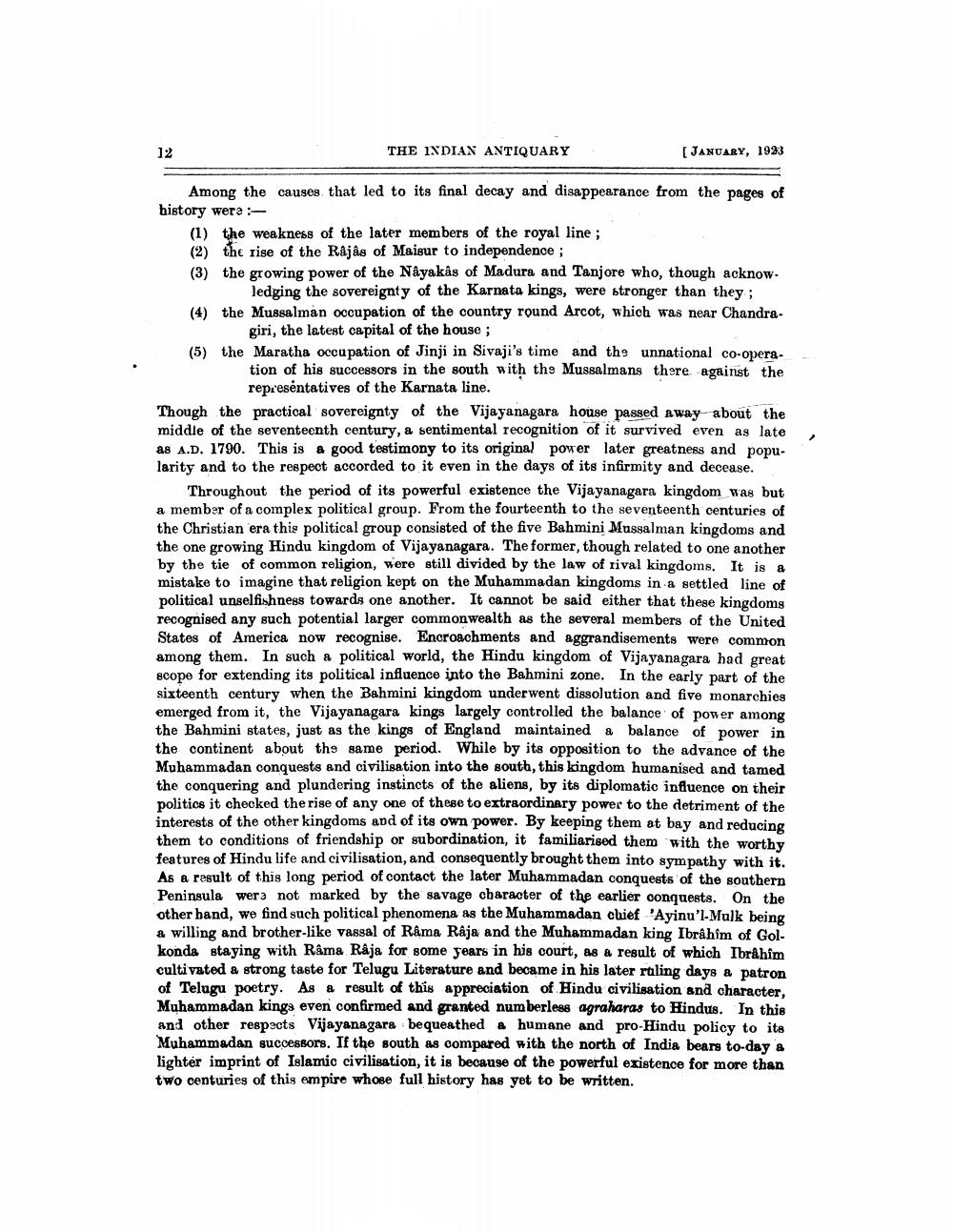________________
THE INDIAN ANTIQUARY
[JANUARY, 1923
Among the causes that led to its final decay and disappearance from the pages of history were :
(1) the weakness of the later members of the royal line ; (2) the rise of the Râjâs of Maisur to independence ; (3) the growing power of the Nayakâs of Madura and Tanjore who, though acknow.
ledging the sovereignty of the Karnata kings, were stronger than they ; (4) the Mussalman occupation of the country round Arcot, which was near Chandra
giri, the latest capital of the house ; (5) the Maratha occupation of Jinji in Sivaji's time and the unnational co-opera
tion of his successors in the south with the Mussalmans there against the
representatives of the Karnata line. Though the practical sovereignty of the Vijayanagara house passed away about the middle of the seventeenth century, a sentimental recognition of it survived even as late as A.D. 1790. This is a good testimony to its original power later greatness and popu. larity and to the respect accorded to it even in the days of its infirmity and decease.
Throughout the period of its powerful existence the Vijayanagara kingdom was but a member of a complex political group. From the fourteenth to the seventeenth centuries of the Christian era this political group consisted of the five Bahmini Mussalman kingdoms and the one growing Hindu kingdom of Vijayanagara. The former, though related to one another by the tie of common religion, were still divided by the law of rival kingdoms. It is a mistake to imagine that religion kept on the Muhammadan kingdoms in a settled line of political unselfishness towards one another. It cannot be said either that these kingdoms recognised any such potential larger commonwealth as the several members of the United States of America now recognise. Encroachments and aggrandisements were common among them. In such a political world, the Hindu kingdom of Vijayanagara had great scope for extending its political influence into the Bahmini zone. In the early part of the sixteenth century when the Bahmini kingdom underwent dissolution and five monarchies emerged from it, the Vijayanagara kings largely controlled the balance of power among the Bahmini states, just as the kings of England maintained a balance of power in the continent about the same period. While by its opposition to the advance of the Muhammadan conquests and civilisation into the south, this kingdom humanised and tamed the conquering and plundering instincts of the aliens, by its diplomatic influence on their politics it checked the rise of any one of these to extraordinary power to the detriment of the interests of the other kingdoms and of its own power. By keeping them at bay and reducing them to conditions of friendship or subordination, it familiarised them with the worthy features of Hindu life and civilisation, and consequently brought them into sympathy with it. As a result of this long period of contact the later Muhammadan conquests of the southern Peninsula wera not marked by the savage character of the earlier conquests. On the other hand, we find such political phenomena as the Muhammadan chief 'Ayinu'l-Mulk being a willing and brother-like vassal of Rama Raja and the Muhammadan king Ibrahîm of Golkonda staying with Rama Raja for some years in his court, as a result of which Ibrâhîm cultivated a strong taste for Telugu Literature and became in his later ruling days a patron of Telugu poetry. As a result of this appreciation of Hindu civilisation and character, Muhammadan kings even confirmed and granted numberless agraharas to Hindus. In this and other respects Vijayanagara bequeathed a humane and pro-Hindu policy to its Muhammadan successors. If the south as compared with the north of India bears to-day a lighter imprint of Islamic civilisation, it is because of the powerful existence for more than two centuries of this empire whose full history has yet to be written.




